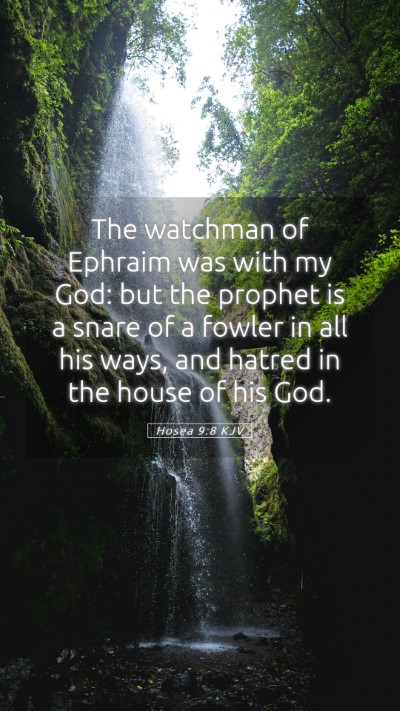Old Testament
Genesis Exodus Leviticus Numbers Deuteronomy Joshua Judges Ruth 1 Samuel 2 Samuel 1 Kings 2 Kings 1 Chronicles 2 Chronicles Ezra Nehemiah Esther Job Psalms Proverbs Ecclesiastes Song of Solomon Isaiah Jeremiah Lamentations Ezekiel Daniel Hosea Joel Amos Obadiah Jonah Micah Nahum Habakkuk Zephaniah Haggai Zechariah MalachiHosea 9:8 Meaning
What is the meaning of Hosea 9:8?
The watchman of Ephraim was with my God: but the prophet is a snare of a fowler in all his ways, and hatred in the house of his God.
Hosea 9:8 Bible Verse Meaning
Understanding Hosea 9:8
Bible Verse: Hosea 9:8
“The watchman of Ephraim was with my God: but the prophet is a snare of a fowler in all his ways, and hatred in the house of his God.”
Bible Verse Meanings and Interpretations
This verse from the Book of Hosea emphasizes the juxtaposition of the faithful watchman and the deceptive prophet. The verse encapsulates the struggle within the nation of Israel—Ephraim in particular—where genuine spiritual oversight is compromised by false prophecies. Here’s a deeper look into its meanings from renowned public domain commentaries:
- Matthew Henry: Henry interprets this verse as a commentary on the state of prophetic guidance in Israel. The 'watchman' signifies those who were meant to protect the people spiritually but have fallen into deception and betrayal. While some claim to speak for God, they lead the people into spiritual traps.
- Albert Barnes: Barnes suggests that the 'watchman' here refers to a true prophet who stands vigilant in warning the people against sin. However, it contrasts sharply with the prophets who have become entangled in their own deceit, leading to animosity even within God's house. He points to prophetic failure and its severe impact on the community.
- Adam Clarke: Clarke analyzes the phrase 'a snare of a fowler', indicating that false prophets ensnare the people with their words. They entrap the unsuspecting in their misguided teachings, leading them further from divine truth. His emphasis is on the internal struggle faced by the children of Israel, illustrating a broader decay of spiritual integrity.
Scripture Analysis
The analysis of Hosea 9:8 reveals various critical themes:
- Watchfulness vs. Deception: The role of the watchman symbolizes vigilance against spiritual decay, while the 'snare' represents those who lead astray.
- Spiritual Warfare: The conflict between true and false prophecies is indicative of the greater spiritual battle within the hearts of the people.
- Community Impact: The direct consequences of prophetic failure affect not just individuals but the entire nation of Israel, showing the collective nature of sin and its repercussions.
Bible Study Insights
For those involved in Bible study groups or online Bible study sessions, Hosea 9:8 provides rich material for discussions:
- Bible Study Topics: Explore the characteristics of true prophets versus false prophets.
- Historical Context: Consider the political and religious climate of Israel at the time of Hosea, including the worship practices leading to divine discontent.
In-depth Analysis
This verse also prompts deeper questions about the nature of prophecy and leadership within the Church today:
- How to Interpret Bible Verses: Approaching this verse requires an understanding of the historical and cultural background of the prophet Hosea as he speaks to a nation in moral decline.
- Application to Daily Life: Reflecting on whom we listen to for spiritual guidance can help in discerning true versus false teachings.
Significance and Applications
The significance of Hosea 9:8 emerges in its call for discernment in our spiritual journeys:
- Application: Evaluate the influences in our lives—both prophetic and secular—and ensure they align with Scriptural truths.
- Promoting Awareness: Engage in communal discussions on the role of modern-day watchmen (leaders) in the faith community.
Cross References
Hosea 9:8 aligns closely with themes in other Scriptures:
- Jeremiah 14:13-15: Discusses false prophets leading the people astray.
- Ezekiel 34:1-10: Condemns the shepherds of Israel for failing to care for their flock.
- Micah 3:5-7: Addresses the false prophets who promise peace while leading the people to ruin.
Conclusion
Hosea 9:8 serves as a poignant reminder of the need for vigilance in our spiritual lives, discerning between faithfulness and deceit. Through careful biblical exegesis and study, this verse offers profound lessons on leadership, community, and the importance of adhering to divine truth.


